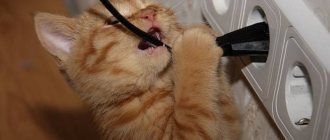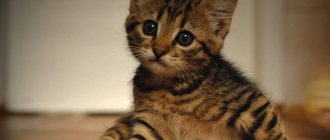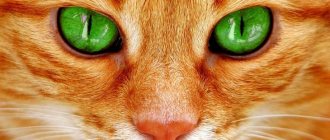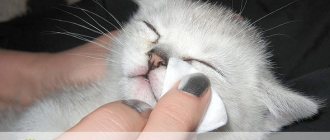The development of kittens largely depends not only on the mother cat, but also on the owner. Conventionally, early development can be divided into stages. At each stage, it is necessary to provide small pets with adequate nutrition, timely medical care and normal physical activity. What stages of kitten development do experts identify and what is the role of the owner at each of them? Why and are all kittens born blind? When does a kitten begin to see, and what affects it? The article contains answers to these and other questions.
The first year of a kitten's life is filled with significant events. It's hard to imagine that a tiny, blind, meowing lump that fits in the palm of your hand can turn into a full-fledged adult cat in just twelve months. A typical kitten growth chart shows that most of the changes—and the most surprising—occur during the first eight weeks.
When a person picks up a kitten from a nursery or purchases it from a breeder, the age of the baby is known down to the day. But if a foundling appears in the house, saved from death on the street, the approximate age is determined by the stage of development of the animal, each of which is characterized by changes in the development of the cat’s body.
Kittens are born without hearing or vision
Why are people born blind?
It is worth noting that the “unfortunate” cubs of the cat family share this fate with another faithful companion of man - newborn puppies. Both spend some time after birth with their eyelids completely glued together. How can this feature be explained?
Kittens with closed eyes
There have been no scientific studies on this issue. But caring owners of furry and squeaking creatures, through simple observation, deduced three main reasons:
- Kittens are born two weeks premature. This physiological feature was formed during the time of their wild ancestors. The female had to quickly recover in order to continue hunting, obtaining food, which is almost impossible to do with a huge belly at the ready.
- Closed eyes act as a defense mechanism. A newborn kitten has a very weak immune system and is unable to cope with hostile viruses and bacteria in the environment. When the body becomes stronger, the eyes begin to open.
- Performing a protective role, but already in the womb. It is believed that the liquid in which the embryo resides is not clean or sterile. Therefore, nature, by “covering” the kittens’ eyes and ears, made sure that no pollution entered the developing body.
The main reasons for the birth of blind kittens
To begin with, it is worth noting that the newly born kitten is not only blind, it is also deaf. True, this state does not last long, about 10 days, then the kitten begins to open its eyes, get used to the light and gradually develop. Sometimes it happens that some cubs are born with fully sighted functions. But such cases can be considered exceptions and the cause may be solely the physiological characteristics of the cat itself. As for the main reasons for the appearance of a blind kitten, these include the following :
- Physiological characteristics of cats : it is known that the pregnancy period for a cat is not so long, so after a short period of time she immediately gives birth to kittens. Due to lack of time, kittens do not have time to see clearly, so the process of formation of this function occurs after birth.
- Another reason why kittens’ eyes do not open immediately is a protective function. After birth, the kitten is very weak and its immunity does not allow the body to resist bacteria and viruses well. Therefore, the eyes are kept closed so that the blind kitten does not receive damage, and as soon as the immunity is restored, the kittens begin to see. But at the same time, they still go through the process of getting used to the light and developing vision.
- Another reason for the appearance of a blind kitten is the very process of development of the kitten in the womb. The fact is that he is forced to be in a liquid that is far from perfect and pure. Therefore, to prevent a blind kitten from receiving damage that could negatively affect its development, its eyes and ears are tightly closed to prevent contaminated fluid from entering the body. Therefore, a blind kitten is not a punishment, but a completely adequate defense of the body.
Now you know why a kitten is born deaf and blind, and as you might guess, everything is the will of nature. Physiological characteristics, the need to protect a blind newborn, protecting the mother from excessively long gestation and much more. There are many reasons and we have already discussed the main ones, but what is important is not the knowledge itself, but the fact that cute kittens are born and grow up completely healthy, beautiful and active . The main thing is to love and protect them so that harsh reality cannot interfere with the fate of the little kitten.
When a cat gives birth to babies, she, like any other mother, begins to care for them. Pet owners should also know how to provide newborn babies with a comfortable and joyful life. It would be useful to study information about when kittens' eyes open and what you need to know about this process.
How long does it take for kittens to open their eyes?
It is impossible to say for sure on what day the eyes open. Everything is very individual. Some babies begin to see sight already on the 5th day after birth. For others, the process is delayed for two or even three weeks. The average period is 10-12 days. There are several factors that determine when kittens begin to see:
- breed;
- developmental features;
- the course of pregnancy in a cat;
- living conditions of the cubs.
Kittens with open eyes
Interesting fact: post-term babies develop much faster than their peers. Consequently, their eyes open much earlier (sometimes already on the second day after birth).
What if the kitten was born with its eyes open?
There are many reasons why cat cubs are born with their eyes open. Some of them are harmless, others can lead to serious consequences. It happens that immediately after birth, the eyes of sphinxes are open. This is a feature of this breed. It is worth noting that the shorter the fur, the earlier cats open their eyes. But in any case, this is a deviation, not the norm. Such a kitten needs special attention and special conditions created for it.
Sphynx kitten
Sphynx kittens
Sometimes it can be a birth defect that causes loss or underdevelopment of the eyelids. The animal will not be able to blink on its own and, without treatment, will soon go blind due to a dry cornea and infection of the eye. To prevent this from happening, you need to make sure that the light does not fall on the kitten; it is better that it is in a dark place. Use special products to wash, moisturize and disinfect your eyes. Do not delay visiting the veterinarian and follow all his recommendations.
Even if the integrity of the eye is not compromised, the same instructions must be followed. Kittens can't see anything yet, but their eyes are sensitive to light. Therefore, it is better to keep them in a darkened space for two weeks, creating conditions as if their eyes were still closed. Of course, the mother will monitor hygiene and clean the cubs' eyes. It is important to control this process, and in case of suppuration, excessive discharge, or dry eyes, use medications prescribed by a veterinarian.
kitten's eyes are sensitive to light
Features of breeds
The breed of cat also affects the time when kittens first open their eyes:
- In this series, the “foremost” are the sphinxes. Their cubs may already be born with open eyelids. As a rule, representatives of this breed begin to see clearly on the third day.
- Thai and Siamese babies gain sight between the third and sixth days of their stay in this world.
- In Siberian cats, the process begins 5-7 days after birth.
- During this period, Persians also become sighted.
- British babies are helpless until the 6th day of their life, and sometimes longer.
- Oriental cats also gain vision on the 6th day.
- The original record holders in this area are ragdolls, whose eyelids become unstuck no earlier than three weeks of age.
- Scottish “fluffies” begin to open their eyes on the fifth to eighth day, finally gaining sight only on the 14th day.
Interestingly, according to statistics, girls acquire vision earlier than boys, and representatives of long-haired breeds lag behind short-haired and hairless cats.
Also, often the eyes of the first kitten born open earlier than the others.
Breed
What time do kittens' eyes open? This happens first in Devon Rex cats - their kittens open their eyes after 4-5 days, and sometimes literally on the second day. For sphinxes - on the sixth day.
But fluffy ragdolls open their eyes only at about two weeks and even later, which is completely normal for them. In general, the trend is this: in hairless and short-haired breeds, kittens open their eyes after a shorter period of time than in long-haired ones.
When kittens open their eyes depending on the breed: features, why it doesn’t happen on time
Observing newborn kittens is not only entertaining, but also important for a felinologist who has decided to try himself as a breeder for the first time. Each breed has a standard that states at what age the eyes should open. This is an important breeding trait.
In some cases, the cubs do not mature in due time. Why is this happening? When are deviations normal, and in what cases should you contact a veterinarian? This article answers these questions.
Why is a kitten born with its eyes closed?
The living conditions of the ancestors of modern cats in the wild were not conducive to long-term gestation. Therefore, kittens were born premature, blind and deaf. Compared to the young of other species, of course.
The second reason for blindness is the protection of the unformed organism from the penetration of microbes and other unfavorable factors. The cornea of the eye is the gateway to the bloodstream. Cubs need time to obtain antibodies to pathogens from maternal colostrum so that the immune system is prepared to repel microbial aggression.
But the cat does not have time to nurse the kittens for a long time. To feed her offspring, she needs to hunt, then there will be enough milk. Therefore, the development of children in the external environment proceeds at an accelerated pace.
Do I need to do anything with the eyes while they are closed?
Immediately after birth, babies are very vulnerable to infections, so if the mother cat cannot cope with their hygiene on her own, she needs help. Keep your eyes clean by wiping them with a piece of bandage or soft cloth soaked in tea leaves. You can also use chamomile decoction, a weak solution of furatsilin or potassium permanganate. This simple measure will help avoid inflammation and suppuration even after the eyes have opened.
Particular attention should be paid to the eyes of Persians, exotics, and Britons - due to the proximity of the lacrimal canals to the nose, they are more likely to experience inflammatory processes.
When do kittens' eyes open after birth?
The first seven days for babies are spent in silence and darkness. During this period, babies should eat and sleep. To do this, they must not see or hear anything. On average, the opening of the eyes occurs in the second week of life. However, most cat breeds were bred by humans with specified properties, so the timing of eye opening and other development criteria changed along with the genotype.
Regardless of the breed, the following patterns exist regarding the timing of maturation:
- the kitten born first opens its eyes earlier than others;
- in animals with short hair, the eyes open earlier than in long-haired animals;
- kitties gain sight faster than seals;
- kittens from older cats open their eyes earlier;
- There is an inverse relationship between the duration of pregnancy and the timing of maturation of the cubs.
How kittens develop further
Kittens usually develop their baby teeth at three weeks of age. A nursing cat may no longer be able to provide milk to her offspring, and the kittens should be gradually transferred to adult food, as well as litter box training should begin.
A four-week-old kitten weighs up to half a kilogram, is active in exploring the world through play, and can wash itself. At this age, the first prevention of parasites can be carried out.
It is very important to hold the cat in your arms so that it gets used to people and communication.
Since babies, like children, explore boundaries during this period, try not to get bitten or scratched hands while playing, otherwise this pattern of behavior will be left in the kitten, and in the future there may be problems with the manifestation of predator instincts towards humans. It is better to use strings, candy wrappers, and special toys for playing.
At 7-9 weeks, kittens' eye color changes, they can purr and try to explore all the most inaccessible places, so you need to pay attention to safety. The immune system has already developed, and the baby can receive its first vaccinations. Animals accustomed to the tray begin to look for their own toilet.
By three months, the kitten’s weight reaches approximately one and a half kilograms. Energy is in full swing and, being predators by nature, babies often play at night. In the fourth or fifth month, baby teeth fall out and permanent teeth grow in their place: first the incisors, then the canines. Inappropriate objects may get caught on the tooth, so you need to make sure that there is nothing to injure the kitten: you should limit access to hard, sharp objects, as well as to wires.
From the fourth to the ninth month of life - this period is individual for everyone - kittens enter puberty, their mood and character may change. And at this time, the owner can consult a doctor about the timing of sterilization; this usually occurs between the 9th and 15th month of life, depending on the breed and other factors.
Why don't kittens' eyes open on time?
Eye opening does not always occur on time for the following reasons:
- Conjunctivitis - inflammation of the mucous membrane may begin before opening. In this case, the microbes are transmitted by the mother. The owner is to blame for not vaccinating the cat in a timely manner and feeding it inferior food. The owner is given the opportunity to correct the error. The mother is transferred to super premium food intended for juniors or kittens over a month old. Inflamed organs of vision are washed with Diamond Eyes drops or analogues.
- Fusion of the eyelids: the problem can only be resolved by a veterinarian surgically or with the help of therapeutic massage.
What to do after kittens open their eyes
Caring for babies' opened eyes is necessary. Clean eyes without discharge indicate the health of the kitten. Sometimes dirt can get into the eye or one of the other cats will scratch it, causing inflammation. To exclude such a result, you need to examine your eyes daily and wipe them with a clean cotton pad with boiled water or tea leaves. It’s better to contact a specialist who will recommend special eye drops for kittens. Diamond Eyes or Iris are usually prescribed.
The procedure is carried out as follows:
- Wipe the kitten's eyes with a cotton pad from the inside to the outside.
- Secure the kitten and place the amount of medication recommended by your veterinarian into the inside of the eye.
To prevent inflammation during the first time after the kitten’s eyes open, a special medicine is instilled into them.
- Pat your eye with a dry cotton pad.
With daily care, kittens get used to it and calmly tolerate this procedure. The doctor will schedule an individual time to continue this treatment.
Treatment with tea leaves and instillation is especially necessary until the kitten begins to fully see and confidently navigate. And after that, you can simply examine his eyes every day and, if a problem arises, immediately begin treatment with the help of a veterinarian.
At what age does this happen?
The most important event for a cat's baby is the opening of its eyes. The process begins at approximately 2 weeks of life and lasts about 7 days. At first, babies slightly open their slits - their eyes, which become wider every day.
For the first 7 days, newborns do not see or hear anything around. At the beginning of life, it is necessary for them to be in a dark room; bright light negatively affects the development of the visual organs. After opening, the eyes are cloudy, with motionless pupils, until they begin to respond to stimuli and transmit signals from the optic nerves to the brain. After 2-3 days, the pupil becomes mobile, and the membrane of the eyes becomes transparent. After the eyelids open, kittens begin to move more and pay attention to objects that are interesting to them.
Possible problems and methods for eliminating them
You can worry about and do anything about a kitten’s unopened eyes only after 21 days of age. Until this moment there is no particular reason to panic. But to be on the safe side, after the second week of development, the babies’ eyes are periodically examined. A simple rule will allow you to notice possible deviations in time.
Problem #1: Eyelid Fusion
If the eyelids are partially fused, you can try a gentle massage. Initially, carnivores are born with eyelids fused, but by two to three weeks of age they should open. If by this time the gap has not appeared, the eye sockets look swollen, pus accumulates in the corners of the eyes and on the eyelids themselves, then it’s time to sound the alarm.
With partial fusion, a gentle massage with gradually increasing stretching will help. The peels are pre-soaked with drinking tea. After the procedure, the edges of the eyelids are lubricated with boric alcohol.
If the upper and lower eyelids are completely fused and firmly attached, surgery will have to be performed by an experienced veterinarian. The work is not difficult, but requires care and caution:
- To begin with, novocaine is instilled into the conjunctival sac for pain relief.
- After a few minutes, the fusion line is cut with a sterile and sharp scalpel.
- After this, for another two or three days, the edges of the eyelids are smeared with boric petroleum jelly and the eyes are washed with saline solution to prevent re-sticking.
Problem #2: conjunctivitis
The eyes may not open as a result of an infection developing against the background of an infectious process or some kind of injury, for example, accidental scratching by one of the brothers or sisters. The disease is accompanied by swelling of the eyelids, their sticking together due to dried discharge of a dirty brown color.
What can be done:
- The eyes are washed daily several times a day with a weak solution of tea or ordinary boiled water. This will help to first soften and then completely wash away the pus that prevents the eyelids from opening.
- Instead of sleeping tea leaves, you can use special preparations. Ask your veterinarian which drops to take.
- Usually, after a couple of days of simple therapy, the eyes return to normal and the kitten feels great.
- If the process is prolonged and pus continues to be released, then the discharge is sent to the laboratory to identify the causative agent of the pathology.
- The specialist chooses further treatment based on the analysis results.
Why are kittens born blind?
Cubs are born blind, which is provided by nature to preserve their eyes. In addition, there are several reasons for this phenomenon:
- The babies' eyes are closed to protect them from infections, which often enter the mother cat's body and can be transmitted to offspring.
- The animal's amniotic fluid, in which the kitten swims, is also far from clean. Since immunity in fetal development has not yet been formed, this helps to avoid diseases of the organs of vision.
- Since a cat’s pregnancy proceeds very quickly, the development of the visual organs does not have time to fully occur in the mother’s body and continues after birth.
What determines the timing of eye opening in kittens?
The time it takes for babies to open their eyes is influenced by many factors.
Breed
It is genetically determined that in kittens of different breeds, the opening of the eyes takes a different period of time:
- Newborn Ragdolls are characterized by extremely slow development of their visual organs - pets begin to see in the 3rd week of life and later.
- Maine Coons begin to see sight 14-16 days after birth.
- Cubs of Siberian breed pets open their eyes at 12-17 days, just like British ones.
- Small Cornish Rex can see at 5-7 days.
- Kittens of Siamese, Abyssinian and Sphynx breeds are sometimes born with open eyelids and vision becomes focused by 3-4 days.
- Scottish Fold, British and Bengal newborns begin to see 7-9 days after birth.
- Kittens of short-haired breeds develop faster than long-haired ones.
In female kittens, the process of opening their eyes is faster than in males. In addition, the stronger and more active the kitten, the sooner they will open. It is useful to hold babies in your hands or stroke them. The cat begins to lick the offspring more intensely and more often to get rid of foreign odors, thereby accelerating the development process of the kittens.
Date of birth
The period of gestation of babies affects the speed of their development after birth.
The longer a cat carries offspring, the faster the newborns open their eyelids, the higher the likelihood of them being born with open ones. In this case, it is necessary to pay special attention to moisturizing the membranes of the eye, otherwise the development of diseases is likely.
Health status
Healthy babies who have enough nutrients and are well-groomed open their eyes much earlier than those whose condition is worse. Viruses and the presence of congenital pathologies slow down the development process.
Cleaning products
Based on the nature of the discharge, you can determine the cause of the disease and choose what to wash your cat’s eyes with. Thick purulent yellowish discharge and sticking of the eyelids indicate infection with fungi, bacteria or other types of infections. Watery, colorless discharge indicates injury or an allergic reaction. Colorless discharge that turns brown when it dries indicates that particles of dirt or dust have gotten into the eyes.
Ready-made solutions for washing the eyes of animals are sold in veterinary or regular pharmacies. They are safe for the eyes of animals. They can also be made at home from available components. If you don’t know how to wash your cat’s eyes, pay attention to our recommendations.
Attention! There is no need to rinse your cat's eyes as a preventive measure, otherwise the sensitive eyes can be harmed.
- Furacilin.
The most relevant and inexpensive eye wash is a 0.02 percent solution of furatsilin. The medicine in higher concentrations can cause irritation and even burns of the cornea, so it is not recommended to dilute the solution yourself. - Boric acid.
Can be used in case of purulent inflammation of the eyes in the absence of bleeding and damage to the mucous membranes. - Saline.
Saline solution should be purchased at a pharmacy in a concentration of 0.9% to avoid burns to the mucous membrane.
- Chlorhexidine.
You can also wash your cat's eyes with chlorhexidine at a concentration of 0.01%. This remedy is easy to use at home. - Potassium permanganate.
Potassium permanganate crystals must be dissolved in water until a slightly pink liquid is obtained. Undissolved crystals can cause chemical burns. - Herbal decoctions.
To cleanse the eyes, you can use weak infusions of herbs such as calendula, hyssop, chamomile or St. John's wort. Pour 1-2 teaspoons of herbs into 200 g of boiling water and leave for 7-10 minutes. Then strain through several layers of gauze, cool and use. - Black tea.
To wash the eyes of cats, you can use not freshly brewed tea, but sleepy tea: before use, the tea leaves should sit for at least 10-12 hours, or better yet, a day. Also, you cannot use tea in bags, but only leaf tea.
As for kittens, it is better to entrust the choice of products for treating the eyes of small pets to a veterinarian. The fact is that pharmaceutical drugs or home remedies that successfully cure adult cats may not be suitable for kittens due to their imperfect immune system. If the discharge is insignificant, then you can rinse the kitten’s eyes with ordinary clean boiled water. If the discharge is profuse, with pus, then you need to use the following remedies:
- “Diamond Eyes” - the main component is chlorhexidine. Taurine and Chlorocide C, also included in this medicine, have a healing effect;
- "Bars" in the form of drops is recommended for lotions. The drug contains furatsilin, which destroys microbes. The analgesic effect is provided by novocaine;
- the drug "Iris" contains the antibiotic Gentamicin and healing components such as sodium metabisulfite, polyvinylpyrrolidone, EDTA;
- for purulent conjunctivitis, use eye drops containing the antibiotics Levomycetin or Ciprofloxacin.
When does eye color appear?
For several days after opening, the kitten’s vision organs have a cloudy bluish tint. The baby does not see, but distinguishes between light and darkness. After a week, the delicate pupil begins to adapt, and it becomes easier for the kitten to tolerate bright light. At this age, everyone's eyes are the same color. Individual pigmentation begins to form at 4 weeks of life and becomes noticeably visible after 3 months.
Full vision appears at the age of about a month.
At approximately 3 months, it begins to change based on the breed and color of the animal. For each breed, this period is individual and can fluctuate up or down. The final color of the eyes is formed by six months of the animal’s life. In Siamese kittens it is brightest during adolescence and fades as they grow older.
Kittens in the first weeks of life
Kittens are born completely helpless and can only move by crawling. The ears fit tightly to the head, covering the auricles that are not yet functioning, the eyes are closed, but the sense of smell is working. It is this that helps to find the mother's nipple, and babies can find the mother cat by smell even at a distance of half a meter.
The need for nutrition at an early age occurs every three to four hours, regardless of the time of day; the rest of the time, kittens usually sleep.
The umbilical cord in kittens falls off within four days. A cat licks its offspring not only to maintain hygiene, but also to stimulate the digestion process in babies.
In a situation where, for one reason or another, kittens are left without a mother, they face imminent death, unless they are “adopted” by another cat or a person intervenes. When newborn kittens appear in the house, it is necessary to equip them with a safe warm place, this could be a box with a blanket inside, a heating pad or a plastic bottle with warm water wrapped in a towel will serve as a heat source. You can feed kittens with a special formula for newborns from a syringe without a needle or using a syringe. When time is limited, infant formula purchased at a regular pharmacy is suitable for feeding, the main thing is that it does not contain sugar or fruit additives. The kitten should gain weight by an average of ten grams per day.
In addition to nutrition, you need to take care of bowel movements and protection from viruses to which a small organism that is not protected by maternal immunity is susceptible. The selected babies must be shown to a veterinarian to rule out the presence of diseases, or to prescribe treatment. The doctor will also advise on the next stages of caring for the kitten.
The level of development of kittens changes literally every day. From about the fifth to tenth day, the ears begin to open and the ability to hear develops. It is necessary to protect newborns from noise, because all sharp sounds are acutely perceived by delicate ears.
If newborn kittens find themselves without a mother, there is almost no chance of survival
In the period from 7 to 12 days, the kittens' eyes open, but their vision does not immediately become clear. The eye color at the beginning is the same for all newborns - light blue, the iris will change over three months with the accumulation of melanin.
Having seen the world, the kittens begin to explore it more confidently and make their first attempts to stand on their paws. But undeveloped muscles do not allow them to move smoothly, quickly and far, so unsteady babies gradually learn to walk. As a rule, it occurs one and a half to two weeks after birth.
At this time, kittens not only learn about the world, but also get used to their surroundings: brothers and sisters and humans. They learn to communicate and fight for the mother's nipple with other cats, and shout to the mother cat about their needs. You need to get used to holding hands already at this age, paying attention to the kitten for three minutes.
The age of one month is characterized by the ability to walk quite confidently, the kittens learn to crawl out of their house, during this period the owner needs to ensure the safety of the kids so that they do not fall from a height, and also do not crawl around the house so as not to accidentally be crushed.
At the age of three months, kittens become almost independent
What to do if your eyes do not open on time
If a cub does not open its eyes for more than 2 weeks, this is not a cause for alarm. It is necessary to carefully examine the animal's eyelids. If there are no signs of inflammation, you can wash your eyes with a weak solution of boric acid or strong tea. You can take a moistened cotton pad and wipe your eyelids.
If they stick together, sour and crusts form, you must first soak them and then wipe them with light movements, avoiding pressure. If decay or inflammation is noticeable, you should immediately contact your veterinarian so that he can prescribe special drops.
About problems and the need to call a veterinarian
Don't panic if the kittens' eyes haven't opened within two weeks. Wait another week and then start taking action.
If the kittens’ eyes have not opened 3 weeks after birth, then you need to contact a veterinarian
Fusion of eyelids
A long absence of eye opening in kittens may indicate fusion of the eyelids. If this problem occurs, the doctor will recommend a light massage. If it does not help, then a simple operation will be required, which is done under local anesthesia. An anesthetic is injected into the corners of the animals' eyes, after which a specialist cuts the eyelid with a sharp scalpel. At the end of the operation, the veterinarian recommends treating the eyes with a special solution (usually a 2% boric acid solution).
Suppuration
When suppuration occurs, the kittens' eyes are washed with tea leaves or medications from the pharmacy - saline solution, boric acid solution, etc. A veterinarian can tell you in detail how to use them. In some cases, he takes the discharge for analysis, thanks to the results of which it is possible to select effective drugs to treat the animal.
Birth of a blind kitten
Kittens are born blind in the full sense of the word quite rarely. If the baby was born blind, then over time his hearing and sense of smell will become well developed, which will allow the kitten to navigate in space and exist separately from its mother. It has been noticed that even the mustache of such animals is noticeably longer than that of their sighted counterparts. If the kitten was born blind, then surgery and treatment will not help.
This is interesting: The cat often goes to the toilet in small increments











